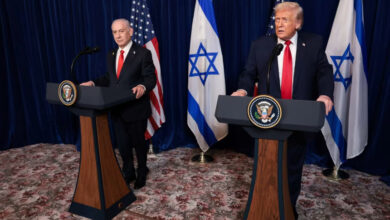Jericho, West Bank–Like the mothballed Oasis Casino in this desert city, the stalled Middle East peace process is waiting for someone to step up and roll the dice.
But nobody is ready to take a gamble. They suspect the tables are rigged. Palestinians say Israel is not interested in a peace treaty. Israel says the truth is the other way around.
US President Barack Obama sees an agreement soon as “a vital national security interest”, as America battles Islamic militants abroad, and may propose a take-it-or-leave-it deal.
For now, Obama wants US ally Israel to break a 15-month deadlock by making concessions to the Palestinians on Jewish settlements and the future of Jerusalem as a shared capital.
Israeli leaders say he is unfairly blaming them for frustrating “naive” peace expectations. They also deny any link between this conflict and violent Islamic “Jihadism”.
Obama’s course, says Deputy Foreign Minister Danny Ayalon, only encourages the Palestinians to continue sitting back, waiting for him “to deliver them Israel on a platter”.
But Defence Minister Ehud Barak on Monday warned Israel’s coalition not to forget how much American help it gets. It must show Obama that Israel sincerely wants a peace deal, he said.
The Palestinians, meanwhile, are pleased that Obama speaks “in such clear terms about how a Palestinian state is in US interests”, says Nabil Abu Rdainah, top aide to President Mahmoud Abbas. But it is not yet clear what Obama can achieve.
“The peace process is facing a real stalemate,” he said.
Obama admits he cannot impose a solution unless the parties involved “break out of old patterns of antagonism”. But Israel and its vigilant supporters in the United States fear an “imposed” solution may be exactly what he is weighing.
Israeli Prime Minister Benjamin Netanyahu is officially studying Obama’s recent suggestions for moves he expects this month to get the stalled talks re-started. But no major concessions are likely, say political sources close to premier.
Israel sees the White House team as the problem, and is turning to the pro-Israeli stalwarts of Congress as its friends-in-need, to hold the Obama administration in check.
When Obama called the conflict “a major impediment” to US interests, the Anti-Defamation League accused him of “dangerous thinking” and the World Jewish Congress chimed in. They urged him not to blame Israel for US setbacks elsewhere.
The three leaders hold cards that pose big risks.
Abbas gambled and lost last October by bowing to Obama’s appeal to defer a UN report alleging Israeli war crimes in Gaza. His popularity plunged and in Gaza he was branded a “traitor”. For now he is staying out of the spotlight.
Netanyahu relies for his coalition’s survival on rightist and religious parties who oppose a retreat from settlements, and who could bring down the government to stop it.
Obama would be gambling with his Democratic Party majority in Congress in the coming November election if he were to risk taking an unprecedented tough line with Israel’s leaders.
An Israeli political source said Netanyahu’s strategy for now “is to gain time” until the November congressional election.
Meantime, he will go on warning that a nuclear threat from Iran is the far more urgent problem for all, regardless of the occupation of the West Bank or the future of Jerusalem.
While rejecting any return to organized violence, Abbas will not resume talks suspended for the past 15 months until Israel halts all settlement building, and makes clear what sort of Palestinian state it is prepared to see as its neighbor.
His prime minister, Salam Fayyad, says Palestinians will not accept a truncated “Mickey Mouse” republic. He is pursuing a plan to build a state-in-waiting by the middle of next year, and possibly to invite Western recognition of its independence.
Israeli Foreign Minister Avigdor Lieberman has warned that Israel would respond by annexing West Bank territory.
While the path back to talks remains blocked, it is by no means certain that an “imposed” solution is the way forward.
Obama noted last week that Israel, the Palestinians and Arab states may say: “We are not prepared to resolve these issues; no matter how much pressure the United States brings to bear.”
Speaking anonymously, an Israeli hardliner dismissed naive liberals who cannot see that ending occupation would not satisfy Palestinians but be taken as a promising victory over Israel.
Former Washington ambassador Ayalon, on the other hand, acknowledges that “a settlement would have a very beneficial effect on regional stability”, but it takes two sides.
The Palestinians must want reconciliation, coexistence and a peace “for 500 years, not five”. Western support for Fayyad’s unilateral state would be “a recipe for real failure”, he said.
Netanyahu has lifted roadblocks to help improve the West Bank economy “from the bottom up”. At first, Israel welcomed Fayyad’s drive for a modern state as a complementary policy.
Now it is seen as a Trojan horse to unilateral independence.
Fayyad plans an international airport here in the Jordan Valley, where Holy Land tourism is profitable. But Israel intends to maintain its strong security presence including air control, and no bulldozers will start without its agreement.
Jericho’s casino was full of Israelis until the Palestinian uprising of 2000. Gamblers once crowded the road down to the Dead Sea for a night at the casino until a wave of suicide bomb attacks inside Israel put it far beyond safe limits.
Now the roulette wheels and poker machines stand spookily in the gloom, waiting for action that is unlikely any time soon.
Israel’s 2005 gamble on a withdrawal from Gaza went sour when power was seized by the Islamist movement Hamas, champions of a policy of armed resistance that has split the Palestinian independence movement to its foundations, and enemies of Abbas.
There was war with Iranian-backed Hizbullah in Lebanon in the summer of 2006, and with Iranian-backed Hamas in early 2009.
Now neither of the principals who insist they are ready to make peace despite all this seems ready to take the other at his slightest word, and a showdown may be looming with Obama.
But it’s not all bleak. This month a smart new four-lane, blacktop highway opened to replace the pot-holed old road into Jericho where a grim Israeli checkpoint has been removed.
“This project is a gift from the American people to the Palestinian people”, says a billboard. The road opened in time for events marking 10,000 years of Jericho history.




